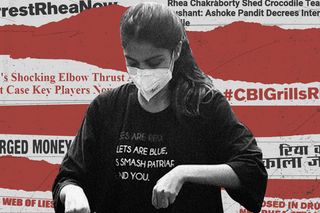
Rhea Chakraborty Is Not A National Villain. She’s A Feminist Icon.
She has shown enormous dignity and strength in asserting her right to mourn and live in peace.

In June, Rhea Chakraborty was an independent woman, living her life in Mumbai with her partner, on her own terms, free of societal scrutiny. She was exercising freedom and agency most women across India only dream about. In only a matter of weeks, the same lifestyle that accorded her freedom was weaponized against her, after her partner, Sushant Singh Rajput, died by suicide. Her lifestyle, one defined by autonomy, quickly became suspect to those who couldn’t understand or allow it, leading to her sudden and absolute alienation from most of the country. Ironically, it’s through this very intense ‘otherizing’ and vilification that Rhea’s story ultimately became one entirely relatable to most women in India — the state of being regarded with suspicion for her choices, condemnation for her desires, and hate for her existence.
Three months after Sushant’s suicide, we see India has already made up its mind about Rhea, already decided she’s to blame — if not guilty of cold-blooded murder, then at least of manipulating him, stealing money from him, hooking him onto drugs, turning an otherwise small-town engineer-turned-actor into someone who was driven to take his own life, in some devious, yet inexplicable way. Everyone has already put her on trial, even though the public, media, and government can’t quite figure out the charges. As allegations flit from financial fraud to emotional manipulation to drug use, we see collective desperation to pin a vague notion of guilt to Rhea, though only one aspect of her remains on trial in the court of public opinion — her lifestyle and her independence. It’s what women in India suffer every day — their lifestyles are subjected to the scrutiny of people way more concerned about delivering judgments on their character than they are about these women’s safety, dignity, or lives. Indian women’s lives teeter between knowing their independence is no crime, yet having to behave like it is, because their agency presents a far more outrageous threat to society than any of their behavior.
In the diversionary circus that is #JusticeForSSR, India found a scapegoat in Rhea, enabled by a patriarchal society that teaches us to ascribe deviance and cunning in every woman who dares to do as she pleases. If Rhea shows strength of character in public, people exclaim at how perfectly cold and uncaring she can be; if she stands up for herself, people look for ways to distrust her; if she is straightforward and vulnerable, people think she’s a manipulative witch. At this point, as far as the media and the masses are concerned, it doesn’t matter what Rhea says or does. The guilty verdict is already in, and anything she does or says will be used against her, simply by virtue of the kind of woman she is — independent, free-thinking, strong. And it’s the kind of woman we can not understand, neither accept, in Indian society.
If any of what’s happening right now were actually about Sushant, we’d be talking about the scourge of mental health problems in India and their accompanying stigma. If it were about Sushant being disadvantaged in his career, we’d be talking about equal opportunity and the ways in which we can better empower marginalized artists. But those are too nuanced and too complicated to elicit the full power of the country’s rage. What is simpler to harness is the unrelenting misogyny that centers a young woman’s character as the focal point of the country’s anger, disappointment, and anxiety. It’s what happens when a patriarchal society looks for a target to unload their rage and disillusionment — it directs a barrage of hate and suspicion at women, whose lived experiences display an exhausting reel of constantly navigating the expectations and biases of their family, their community and their nation.
Related on The Swaddle:
Reimagining Witchcraft as a Refuge for Marginalized Groups
Rhea’s experience reveals the depth of bias society holds against independent women. Initial allegations against her involved age-old accusations of witchcraft often levied upon women who deviate from society’s expectations. TV news channels like Aaj Tak took the bait and ran visuals of a ‘witch’-like Rhea, spinning a narrative of hypnotic control that a devious Rhea exerted over an unsuspecting Sushant. Her presence and influence in Sushant’s life even unnerved his family, to the extent that her every move became a cause for distrust, seen as ploys to isolate Sushant from the people who ‘really’ loved him. This narrative, spun to paint Rhea as a cunning, devious witch with magical powers, not only negated Sushant’s own agency, but also delegitimized their romantic relationship. Even when Rhea calmly explained she helped Sushant seek medical attention for his mental illness, the story became that she was ‘mixing drugs into his coffee.’ An innocuous pooja she once did became ‘evidence for black magic.’ Such is an ordinary woman’s power, that she can tear families apart, empty bank accounts, and lead people to their deaths. It’s almost as if Sushant had no ability to think for himself, let alone make mistakes. The most witch-like thing Rhea is guilty of is taking up space, and if that’s her crime, then every woman is a witch.
Alternatively, Rhea is painted as an uncaring partner, as someone who ‘let’ Sushant die, as if it was her sole responsibility to keep him alive. One of Rhea’s supposed ‘crimes’ was her absence in Sushant’s life during his last few days. By linking her absence to his death, the narrative once again paints her as not having fulfilled a responsibility we so often lay on only women — to serve as emotional crutches for their loved ones, to serve as protectors of their mental and physical health, and consider themselves failures if they fall short. It’s what we expect, even need women to do — be it housewives acting like cheerleaders for their husbands, or sisters putting their reputations on the line to defend their brothers, or mothers being responsible for their children’s wellbeing well into adulthood, or girlfriends and wives being an emotional rock for their partners. Society constantly dehumanizes women into objects that exist to keep someone else alive and well. But in Rhea, we see a woman trying to exist as an actual, vulnerable human being with her own needs and desires, for once trying to put herself, her dignity, and safety before anyone else’s. In her deviation from an age-old gender role, we see power, one that has always been frightening, and therefore unacceptable, in society.
Of course, the public has concluded, Rhea could have only wanted Sushant for material gain. Touting its report as a “massive breakthrough,” Republic TV alleged that Sushant’s bank balance had more than halved in a matter of months, on account of footing Rhea’s “hair, makeup, shopping, [and] parlour” expenses. This tactic invoked another tired trope — that of men making all the money, and women trying to separate them from the fruits of their labor in pursuit of frivolous luxuries. It further branded Rhea the gold-digging, manipulative, unfeeling, and materialistic brand of woman, by whom innocent, hard-working male partners, oblivious to their feminine wiles, will be duped. It signals the inherent distrust society has of women, especially young, hard-working, capable ones, as if completely unable to fathom that a woman could be smart enough to be financially independent, and not need to devise some underhanded, manipulative scheme to get there.
The terms and traits assigned to Rhea in an attempt to “prove” her guilt are highly gendered, in that they’re extremely incriminating for only women in Indian society. The latest attack on her — suspicion and subsequent arrest for her having enabled Sushant’s drug use — shows this witch hunt has now moved beyond Rhea’s own personhood. At this point, it has little to do with her character, her personality or her lifestyle; it’s more about creating a laundry list of lifestyle choices we consider unacceptable for women, and trying to associate them to her in whichever way possible in an attempt to add to an already-existing narrative around her being a free-thinking, manipulative, devious woman.
And as the noise grows increasingly distant from Rhea as a person, and as it becomes increasingly dehumanizing and nonsensical, it’s all the more important for us to center her personhood, her behavior, and her agency. All Rhea has done is ask for a fair evaluation of Sushant’s death as a grieving loved one trying to understand why her partner decided to die by suicide. She has been open and forthcoming about her relationship with him, while constantly making herself available to provide an alternative, human version of events despite the terrifying wave of public opinion against her. With dignity and grace — two traits people often applaud women for, but somehow refuse to afford Rhea today — she displays superhuman strength in front of people hellbent on confirming her guilt. In her steadfastness and honesty, it’s imperative we realize the fight this woman has unwittingly taken on — perhaps for the rest of the foreseeable future, if not her lifetime — simply to exist as a young, independent and struggling woman, who lost a man she loved.
And that’s a right all women in India are fighting constantly, to either earn or exercise — to be themselves, to exist without censure, to portray vulnerability without being called manipulative, to grieve without being blamed, to live on their own terms in a society that can accept and welcome them. Rhea may not have wanted this burden, but India has collectively thrust it upon her. In a country that is gunning for her destruction, Rhea’s existence is revolutionary, and so is the existence of every woman who stands beside her.
Related


Is This Normal? “Every Time I Start to Feel Happy, I Get Scared Bad Things Will Happen”
